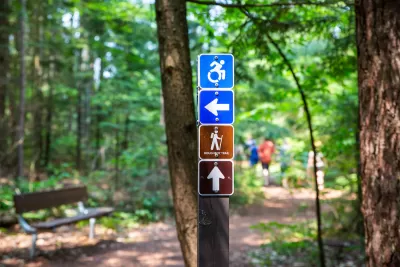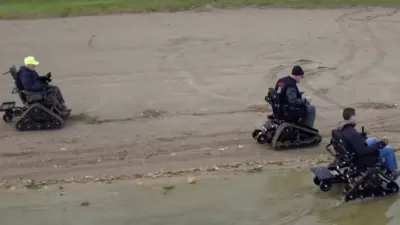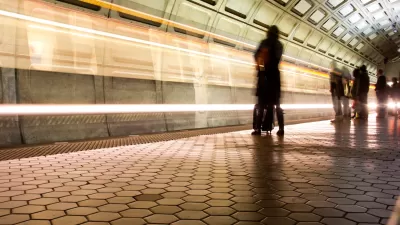State parks are introducing adaptive mobility devices to help more visitors enjoy natural spaces.

Writing in Governing, Tom Peterson outlines the effort states are making to make more parks and cultural resources accessible to residents with mobility challenges.
“In Minnesota, such efforts got a significant boost earlier this year when legislators funded the Department of Natural Resources’ $149.9 million Get Out MORE (Modernize Outdoor Recreation Experiences) initiative.” Visitors who want to see the Split Rock Lighthouse can now borrow all-terrain chairs that make Pebble Beach, a popular vista point, accessible to wheelchair users.
States including Michigan, Wisconsin, and Iowa have launched similar initiatives to provide adaptive equipment and facilities like track chairs, cross-country sit skis, and modified kayak launches. “Some state parks also offer chairs that bring visitors onto beaches or even into the water. In several Massachusetts state parks, for example, visitors can use four-wheeled sunbathing chairs on the beach, or three-wheeled floating chairs in the ocean.”
The article adds, “As much as technological gains and new programs help, experts and advocates said improving access does not always require major expenditures. In reaching a community that long had no or limited access to outdoors recreation, communication is vital” to ensure people are aware of the mobility options available to them.
FULL STORY: States Spend Millions to Make Parks, Trails More Accessible

Planetizen Federal Action Tracker
A weekly monitor of how Trump’s orders and actions are impacting planners and planning in America.

Maui's Vacation Rental Debate Turns Ugly
Verbal attacks, misinformation campaigns and fistfights plague a high-stakes debate to convert thousands of vacation rentals into long-term housing.

Restaurant Patios Were a Pandemic Win — Why Were They so Hard to Keep?
Social distancing requirements and changes in travel patterns prompted cities to pilot new uses for street and sidewalk space. Then it got complicated.

In California Battle of Housing vs. Environment, Housing Just Won
A new state law significantly limits the power of CEQA, an environmental review law that served as a powerful tool for blocking new development.

Boulder Eliminates Parking Minimums Citywide
Officials estimate the cost of building a single underground parking space at up to $100,000.

Orange County, Florida Adopts Largest US “Sprawl Repair” Code
The ‘Orange Code’ seeks to rectify decades of sprawl-inducing, car-oriented development.
Urban Design for Planners 1: Software Tools
This six-course series explores essential urban design concepts using open source software and equips planners with the tools they need to participate fully in the urban design process.
Planning for Universal Design
Learn the tools for implementing Universal Design in planning regulations.
Heyer Gruel & Associates PA
JM Goldson LLC
Custer County Colorado
City of Camden Redevelopment Agency
City of Astoria
Transportation Research & Education Center (TREC) at Portland State University
Jefferson Parish Government
Camden Redevelopment Agency
City of Claremont





























